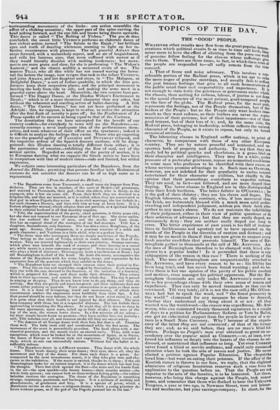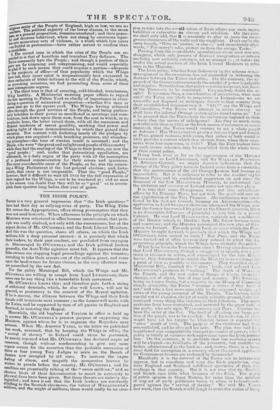TOPICS OF THE DAY.
THE " GOOD" PEOPLE.
WHATEVER other results may flow from the great popular deni
strations which political events frin time to time call forth, thilY never seem to have the effect of eliciting from the press one they
of' genuine fellow feeling for the classes whose sufferings give rise to them. There are three tones, in fact, in which theseerieioi the people are responded to—all sadly remote from the true concord.
1. That of fierce and noisy advocacy. This involves a con siderable portion of the Radical press, which is too apt to eel; the mere anger of popular meetings, and usually fails ils to reflect the just human feelings that give to all such fermentations of the public mind their real respectability and importance. It is not enough to state truly the grievance or grievances under which
the classes, thus uniting for redress, labour, if justice is not done to the moral character of the most patient, good-tempered people on the face of the globe. The Radical press, for the most part, represents the feelings, not of the People themselves, but of the leaders of the People : but as the People only want leaders inas- much as they want redress, so their leaders are never the repre. sentatives of their patience, but of their impatience—not of their good temper, but of their loss of it; and, by the same rule, the Radtcal press, belonging to leadership, seldom reflects the natural character of the People, as it exists in repose, but only its forced occasional attitudes.
The labouring classes in England suffer nothing, in point of character, by comparison with those of any other European country. They are by nature peaceful and contented, and re. specters both of property and authority. To say that they are easily led by political quacks and charlatans, is a gross libel oa their character and intelligence. They may for a while, under pressure of a particular grievance, repose an unmerited confidence in some man who professes to be identified with their cause, or
whose services promise advantage to it. Such men as OASTLER, however, are not indebted for their popularity to undue respect entertained for their character or abilities, but chiefly to the opinion that their proceedings contribute to expedite redress. They are used, in fact—not followed, and are more duped than duping. The lower classes in England are in this distinguished from their Irish brethren. The latter believe in O'CONNELL ; he is the god of their idolatry ; they are his slaves and dupes. The English labourers, on the contrary, who, if less mercurial than the Irish, are fortunately blessed with a much more solid under- standing and independent judgment, seldom pin their faith alto- gether to any man's sleeve. We do not maintain the infallibility of their judgment, either in their view of public questions or in their selection of advocates ; but that they are easily duped, we strenuously deny : they are neither easily duped nor long in error. The bitter experience of past years is too full of instruc- tions in faithlessness and apostacy not to have operated on the minds of the People in the direction of caution and distrust ; and it may be no merit in them if they are now given to suspect every fresh popular candidate that presents himself. The men of Bir- mingham gather in thousands at the call of Mr. Arrwoon. Are the men of Birmingham therefore to be charged with blind alle- giance to a popular leader ? Is it pretended that there is any subjugation of the reason in this case ? There is nothing of the kind. The men of Birmingham are unquestionably attached to Mr. ATTWOOD, and have every reason to be so : his fidelity has been long tried, and has never been found wanting ; and we be- lieve there is but one opinion of the purity of his public conduct and motives, even amongst his political opponents. But the Bir- mingham thousands are only under Mr. Arrwoon's control so far as his proceedings chime with their own sense of reason and expedience. They can only be moved inasmuch as they can be convinced. Till very lately, (if it is not the case still,) Mr. 0 CON. NELL had but to speak the word, and " the finest peasantry in the world" clamoured for any measure he chose to demand, whether they understood any thing about it or not : all they wanted was the watchword—the reason was superfluous. Mr. Arr- WOOD, who can command twenty thousand signatures in a couple of days to a petition for Parliamentary Reform or Vote by Ballot, can get no substantial support from the people in favour of a re- turn to a Small Note Currency. Why ? because of the expedi- ency of the latter they are not convinced ; of that of the former they are ; and, as we said before, they are no man's blind fol- lowers. Perhaps no People's man ever obtained so great an as- cendancy over the popular mind as CoBaerr,—or, at least, ever forced his influence so deeply into the hearts of the classes he ad- dressed, or maintained that influence so long. Yet even Comm never found a blind or servile audience, and could only command attention when he took the side of reason and justice. He never elicited a petition against Popular Education. The chopsticks loved him—but went on eating their potatoes. If the affair of the Kentish rioters is thrown in our face, we reply, that the slightest admixture of' religious fanaticism removes such a case from its application to the question before us. That the People are not superior to the arts of the fanatics, is to be lamented. Let those, however, who bring this charge against the People, look nearer home, and remember that those who flocked to hear the Unknown Tongues, a year or two ago, in Newman Street, were not labour- ers and mechanics, but your carriage-company. In short, for the so; s sanity of the People of England, high or low, we are no rejig The political sagacity of the lower classes, in the mean ,710 as a general proposition, remains unrefuted ; and their peace- ful decorous behaviour, when not stung by enormous injus- f? into momentary acts of violence, is a truth which late years nets fruitful in provocation—have rather served to confirm than
to invalidate. s. The second tone in which the cries of the People are re-
tiPon.ded to is that of heartless and truculent Tory defiance. The Tories necessarily hate the People ; and though a portion of their Doty are for trimming and compromising, and would especially 6, glad if by such means they could acquire a portion—adequate to the purposes of office—of that popularity which the Whigs hare lost, their inner spirit is unquestionably best expressed in those outbursts of bitter defiance to the will of the People, which, on provoking occasions, we find proceeding from some of their more intemperate organs. 3. The third tone is that of sneering, cold-blooded, treacherous, Whig hostility. A Ministerial morning paper affects to regard the late meeting in Palace Yard as chiefly of importance in eluci- dating a question of numerical proportion—whether five men or seven men go to the square yard. The Whigs having achieved Ace through the good services of the People, and being particu- larly beholden to their power as manifested in meetings and com- binations, look down upon them now, from the seat to which, in no prophetic hour, the latter raised them, with all the assurance and flippant insolence of recent gentility, mocking that power and making light of those demonstrations by which they gained their elevation. Not content with forfeiting nearly all the pledges by which place was acquired—with breaking promises, and abandon- ing principles—the tone of wanton insult is assumed ; and the People, who were " the great and enlightened people of this country " while they hail the seating of the Whigs in their power, are now the "good people ; " and, under that patronizing appellation, are addressed, in a daily organ of the party with all the assumption of a profound commiseration fur their errors and ignorance. The most considerable error of the People, so far, was the return- ing a Whig Parliament at the last general election; and, fortu- nately, that error is not irreparable. That the " good People," however, find it difficult to wait till 1844 for the full expression of their regard for the Whigs, is not to be wondered at ; and no man in his senses can doubt that they will be so " good** as to accom- plish their ejection long betore that year of grace.



























 Previous page
Previous page